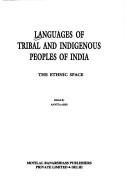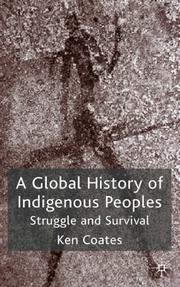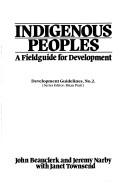| Listing 1 - 10 of 337 | << page >> |
Sort by
|

ISBN: 812081374X Year: 1997 Publisher: Delhi Motilal Banarsidass Publishers Private Limited
Abstract | Keywords | Export | Availability | Bookmark
 Loading...
Loading...Choose an application
- Reference Manager
- EndNote
- RefWorks (Direct export to RefWorks)
Indic languages --- Indigenous peoples --- Sociolinguistics --- Languages. --- Languages
Multi
ISBN: 9781108917643 9781108831567 9781108926874 1108831567 1108926878 Year: 2021 Publisher: Cambridge Cambridge University Press
Abstract | Keywords | Export | Availability | Bookmark
 Loading...
Loading...Choose an application
- Reference Manager
- EndNote
- RefWorks (Direct export to RefWorks)
Christianity and culture --- Conversion --- Indigenous peoples --- History --- Christianity --- History --- Religion
Multi
ISBN: 9780857457639 0857457632 9780857457622 0857457624 9781299777255 1299777252 Year: 2013 Volume: v. 4 Publisher: New York Berghahn Books
Abstract | Keywords | Export | Availability | Bookmark
 Loading...
Loading...Choose an application
- Reference Manager
- EndNote
- RefWorks (Direct export to RefWorks)
The Portuguese Colonial Empire established its base in Africa in the fifteenth century and would not be dissolved until 1975. This book investigates how the different populations under Portuguese rule were represented within the context of the Colonial Empire by examining the relationship between these representations and the meanings attached to the notion of 'race'. Colour, for example, an apparently objective criterion of classification, became a synonym or near-synonym for 'race', a more abstract notion for which attempts were made to establish scientific credibility. Through her analysis
Social sciences (general) --- Racism --- Indigenous peoples --- Portugal --- Colonies --- History.
Book
ISBN: 9781483333472 9781483347035 9781544391496 9781483347028 1483347036 1483333477 1544391498 1483347028 Year: 2020 Publisher: Thousand Oaks, California: Sage,
Abstract | Keywords | Export | Availability | Bookmark
 Loading...
Loading...Choose an application
- Reference Manager
- EndNote
- RefWorks (Direct export to RefWorks)
"Author Bagele Chilisa updates her groundbreaking textbook to give a new generation of scholars a crucial foundation in indigenous methods, methodologies, and epistemologies. Addressing the increasing emphasis in the classroom and in the field to sensitize researchers and students to diverse perspectives - especially those of women, minority groups, former colonized societies, indigenous people, historically oppressed communities, and people with disabilities, the second edition of Indigenous Research Methodologies situates research in a larger, historical, cultural, and global context to make visible the specific methodologies that are commensurate with the transformative paradigm of social science research"--

ISBN: 033392150X 1403939292 9780333921500 9781403939296 Year: 2004 Publisher: Basingstoke: Palgrave MacMillan,
Abstract | Keywords | Export | Availability | Bookmark
 Loading...
Loading...Choose an application
- Reference Manager
- EndNote
- RefWorks (Direct export to RefWorks)
Indigenous peoples --- History --- Social conditions --- Government relations --- Government relations. --- History. --- Social conditions. --- Aboriginal peoples --- Aborigines --- Adivasis --- Indigenous populations --- Native peoples --- Native races --- Ethnology --- Government relations with indigenous peoples --- World history --- Indigenous peoples - History --- Indigenous peoples - Social conditions --- Indigenous peoples - Government relations

ISBN: 0855980885 0855980877 Year: 1988 Volume: 2 Publisher: Oxford Oxfam
Abstract | Keywords | Export | Availability | Bookmark
 Loading...
Loading...Choose an application
- Reference Manager
- EndNote
- RefWorks (Direct export to RefWorks)
Ethnology. Cultural anthropology --- Cultural property --- Indigenous peoples --- Environmental degradation --- Non-governmental organizations --- Biens culturels --- Autochtones --- Environnement --- Organisations non-gouvernementales --- Protection --- Dégradation --- Sociology. --- Dégradation --- Indigenous peoples.
Book
ISSN: 12798428 ISBN: 9782812446528 9782812446535 2812446528 2812446536 Year: 2016 Volume: 20 Publisher: Paris: Classiques Garnier,
Abstract | Keywords | Export | Availability | Bookmark
 Loading...
Loading...Choose an application
- Reference Manager
- EndNote
- RefWorks (Direct export to RefWorks)
L'histoire de la conquête de l'oralité par l'écriture, tout au long de l'âge moderne, est lisible dans certaines représentations de l'oralité sauvage, dans une variété de genres textuels produits par des missionnaires et des chroniqueurs au Brésil. Circonscrite aux topoï du témoignage oculaire et auditif jusqu'au XVIIIe siècle, cette oralité sauvage légitime ensuite le triomphe du projet historico-littéraire brésilien, dont les objets par excellence sont la langue tupi et l'Indien. La condition sine qua non de ce triomphe est de les perdre une fois pour toutes, nostalgiquement, dans les origines les plus lointaines.
Portuguese literature --- anno 1500-1799 --- anno 1800-1899 --- Brazil --- Indigenous peoples --- Oral tradition --- Language --- Indigenous peoples - Brazil - Language --- Oral tradition - Brazil
Periodical
ISSN: 17034566
Abstract | Keywords | Export | Availability | Bookmark
 Loading...
Loading...Choose an application
- Reference Manager
- EndNote
- RefWorks (Direct export to RefWorks)
Indigenous peoples --- Indians of North America --- Legal status, laws, etc. --- Law --- General and Others
Book
ISBN: 9781138729339 9781351747561 9781351747554 9781351747547 9781315189925 Year: 2019 Publisher: London Routledge, Taylor and Francis Group
Abstract | Keywords | Export | Availability | Bookmark
 Loading...
Loading...Choose an application
- Reference Manager
- EndNote
- RefWorks (Direct export to RefWorks)
Human rights --- mensenrechten --- Indigenous peoples --- Civil rights. --- Legal status, laws, etc.
Book
ISBN: 9781789141405 1789141400 1789141737 Year: 2019 Publisher: London Reaktion Books
Abstract | Keywords | Export | Availability | Bookmark
 Loading...
Loading...Choose an application
- Reference Manager
- EndNote
- RefWorks (Direct export to RefWorks)
Licentious Worlds is a history of sexual attitudes and behaviour through five hundred years of empire-building around the world. In a graphic and sometimes unsettling account, Julie Peakman examines colonization and the imperial experience puttting women back in the picture, showing their role in the building of empires, but also how marginalized men and women were almost invariably exploited. Women acted as negotiators, brothel-keepers, traders and peacekeepers, but they were also oppressed, forced into marriages and raped. The book describes daily life in Turkish harems, Mughal zenanas and Japanese geisha houses, as well as in royal palaces, private households and on board ships. The stories are drawn from many sources – from captains’ logs, missionary reports and cannibals’ memoirs to travellers’ letters, traders’ accounts and reports on prostitution. From debauched clerics and hog-sodomizing Pilgrims to sexually fluid cannibals and homosexual samurai, Licentious Worlds takes history where it has never been before
Sex and history --- Colonisation. Decolonisation --- World history --- Exploitation. --- Lust. --- Colonization. --- Imperialism. --- Indigenous peoples.
| Listing 1 - 10 of 337 | << page >> |
Sort by
|

 Search
Search Feedback
Feedback About UniCat
About UniCat  Help
Help News
News